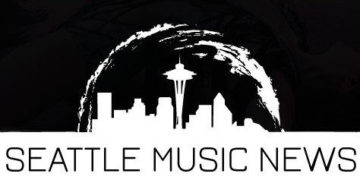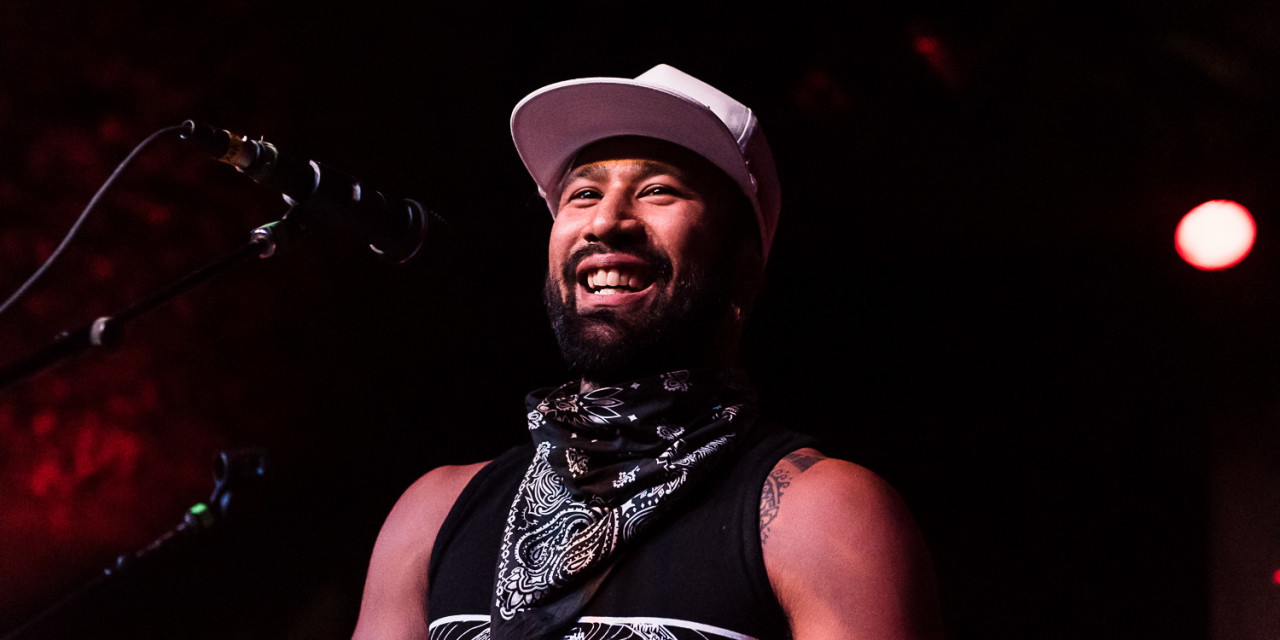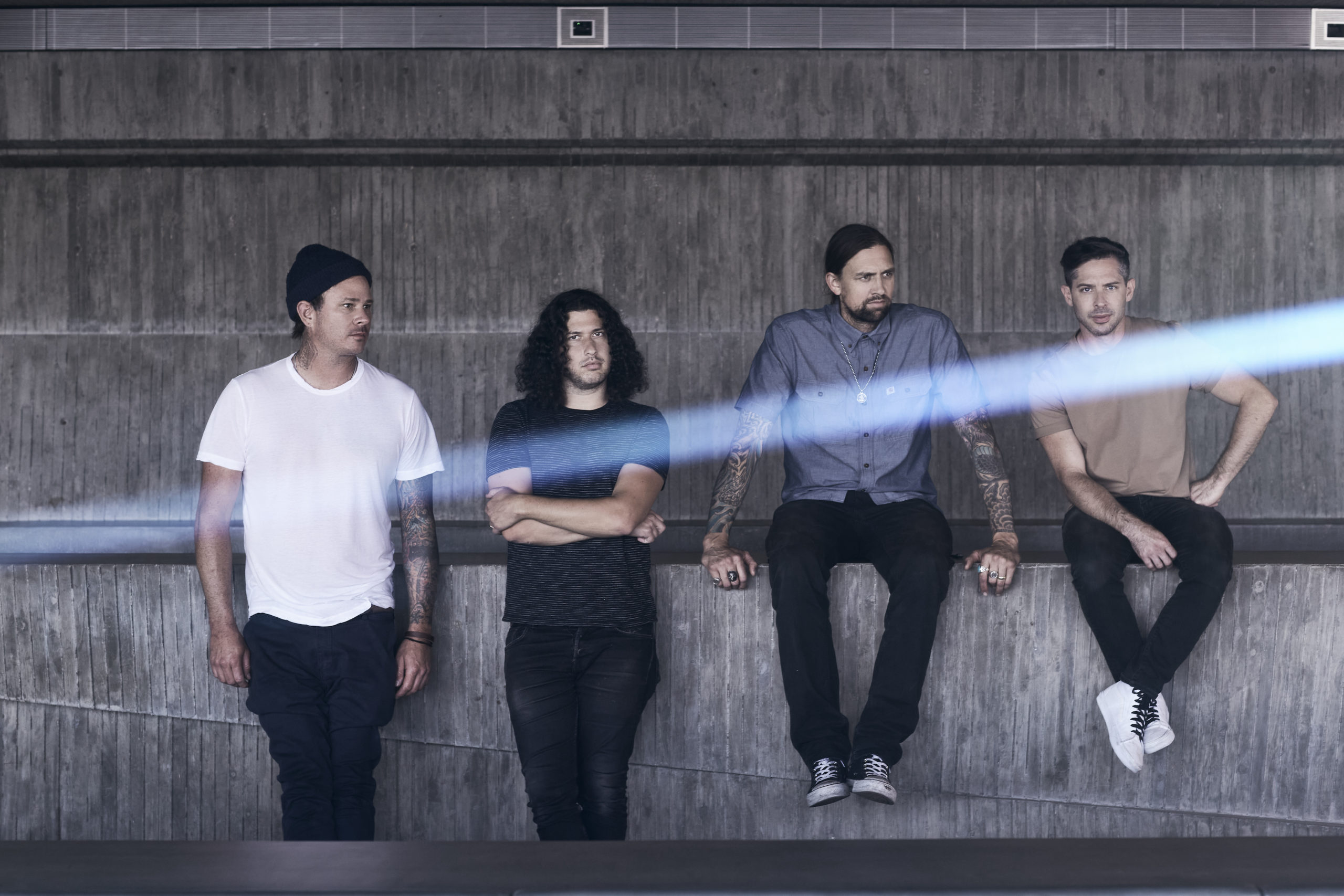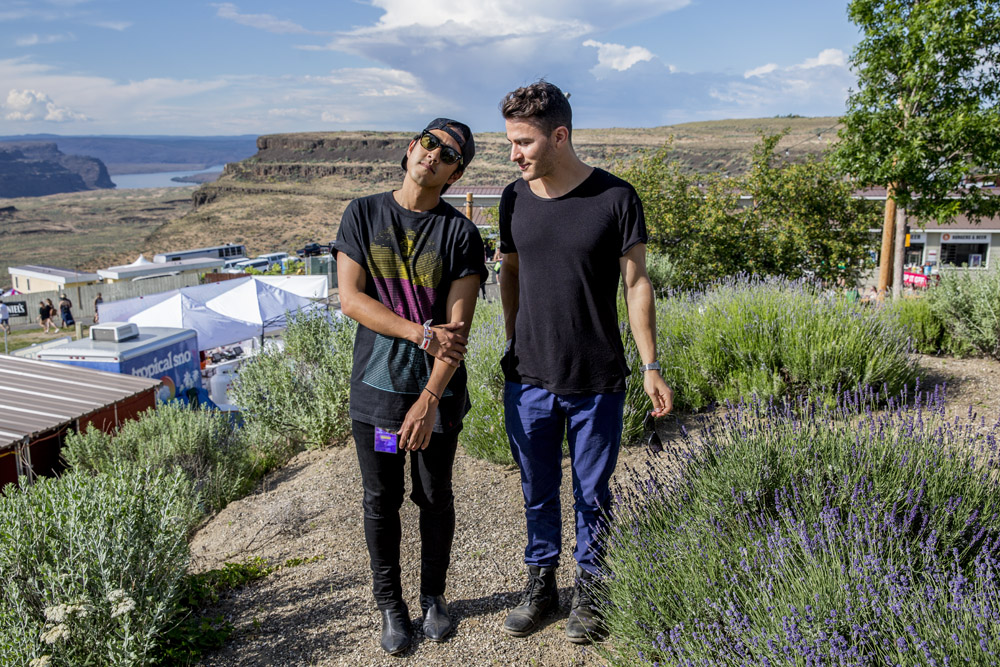Interview: Nahko Bear of Nahko and Medicine For The People
The Showbox, Seattle, WA
10.13.16
I was checking out Nahko and Medicine For The People at The Showbox in Seattle, when, during the opening act, a text came through reading, “Nahko is going to sing on stage with Hirie around 9:25pm. After that, I will come grab you and bring you backstage for the interview.” I replied, “sounds great. Thank you!” and waiting for the moment when Nahko Bear – leader of the civically minded and worldly group – to surprise Hirie on stage for a verse and chorus of the track, “Renegade,” that they had recorded together.
Once Bear ran off-stage and into the back room, I waited patiently for the tour manager to come get me. As she took me back stage, it was a bit loud and crowded. “We’ll have you in here,” she said as she closed the door leading to the stage and then the door leading to the rest of the band, crew, and guests in a separate room. The energy was a bit frazzled as Bear was finishing up a text and clearing up details with the stage manager, but he stopped for a moment in the midst of it, looked at me, greeted me with a sincere hug and kiss on the cheek, and said, “Thank you for coming. Just give me a minute here.”
In a moment it was quiet, just the two of us, and I got to know the man behind the medicine.
Nahko Bear: Hey, how’s it going?
SMN: Good. Things are going well.
NB: So what’s up? Tell me about yourself. [At this point he began interviewing me a bit]
SMN: So I’ve actually met you before, and I have to say, I was a fan of you as a person before I was a fan of your music.
NB: Is this a thing? I wasn’t aware of this. This is great actually. That makes me feel really comfortable now, because I’m like, “oh…thank you.” You know, sometimes it’s hard for me to separate myself outside of this story that I’m creating as a storyteller, but I appreciate that. Thank you. How did that happen?
SMN: Gleason Fest. I was sitting backstage and just observed you for a while, and I couldn’t for the life of me figure out who you had known for a while and who you were meeting for the first time. It was amazing. I just sat there and thought, “Wow. This guy gets it. He’s really special.”
NB: Wow. That’s so great to hear because that’s something that’s actually really important to me. No one has ever acknowledged that before. Man. Thank you. I remember when I was younger and I would go to shows, and sometimes even run into or meet musicians that were like the musician of the show, and it would always be kind of awkward because you want to talk with them, but you’re just a nobody and why would they want to talk with you? I’ve always thought to myself that if I ever made it to that level, I would always try to make sure people felt comfortable and appreciated. That means a lot, thank you.
SMN: Absolutely. You seem to have it down. Okay, rapid fire questions: If you could interview anyone, who would you want to interview? What would you ask them?
NB: John Trudell. He was an American union movement leader; the voice of the American Indians during the time of the Black Panthers. When Malcom X was the voice of the Black folks, the American Indian voice was John Trudell.
SMN: If you could collaborate with anyone, who would you choose to collaborate with?
NB: Chance the Rapper.
SMN: I feel like I should know who that is.
NB: You don’t know who that is?
SMN: No.
NB: Well, you’re from Spokane, I know, but you need to look up Chance the Rapper. He’s like the leading hip-hop voice of our time for conscious music.
SMN: Will do.
NB: Okay.
SMN: I hate to use the word “idol,” but who is your musical idol?
NB: Conor Oberst, “Bright Eyes.”
SMN: What is it about him?
NB: The way that I’ve witnessed him, through his music, transform from being a certain way to a new way. To be more specific, since I was like 15 years old I watched him go from being a very like pessimistic and umm also… bipolar person to becoming very hopeful, and his poetry is… he’s like the Bob to me. My Bob Dylan of our generation. He’s just an amazing weaver of songs and story, plus he does all kinds of styles too, which I really appreciate. Do you know Bright Eyes?
SMN: Yes, I do.
NB: [Into the recorder] She knows Bright Eyes, guys.
SMN: If you were somebody’s musical idol…
NB: If I was someone’s idol?
SMN: Yeah. Pretend like you were, if you aren’t right now.
NB: Okay, I’m going to pretend I’m somebody’s idol. Okay, I’m ready!
SMN: What is it that you want to be recognized for or remembered for?
NB: [Sigh] That’s a good question. I’ll say that I would hope to be remembered… Are you talking about my legacy?
SMN: Yeah!
NB: Oh man, I never think about that. I guess a bridge builder, you know? I’ve been a bridge crosser. Somebody that was able to connect people in a way that connects people and creates a safe space for them to move from a neutral zone, in the passive zone and into the active zone.
SMN: Okay, speaking of that, I’m going to go off-book here.
NB: [Into the recorder] Oh, she’s throwing the notes away.
SMN: As the active; you’re out there, so you’re opening yourself up to being vulnerable to criticisms…
NB: Mmhmm. Oh, my God, yeah.
SMN: I had to look at your Facebook, because….
NB: Did you read the comments?
SMN: Yes!
NB: Oh my God. For what… what…
SMN: The voting post.
NB: Right?! I knew you were going to say that!
[Bear had posted a photo of himself holding an iPad that read, “Register to Vote” and it elicited a lot of critical and supportive comments.]
SMN: So I’m sitting there like… this poor guy. If you could reply to those harsh comments, what would you say?
NB: Well, here’s the thing, and this gets super esoteric too and really into a whole other conversation about what I think we are here for, but to deescalate from that deeper talk which we can have any time, I would respond to that… and you know, I don’t respond to those things because I know that Facebook isn’t “real,” and so the only thing that I use Facebook for really is I love photos (I’m a photographer), I like being able to share pictures with words (that’s cool), and to be able to share movements that are happening and things I support.
So by supporting voter registration, like you’re saying, I definitely feel like there is power in numbers, which is why we’re here. We’re here because we need people, to make things change and to transform into a new society. Which, if you think about these folks – these white folks that are kind of like, anti-government, and stuff like that, I totally understand that. The government hasn’t worked for the people since, since Columbus came. You know? Or whenever. Since they stole the idea of democracy from the Iroquois nation, right? Confederacy. So if people actually did their history and saw where democracy comes from and were able to see that with that knowledge, we can actually take back an old system that worked for the confederacy of those nations and if we can…
Okay, there’s actually this really amazing guy that’s here tonight. Remember The Matrix? The guy in The Matrix – the Key Maker? It was the third one, Matrix Reloaded. He had to go find the Key Maker, right? So anyway, in this…he’s like the fuckin’ Map Maker, right? He’s taking these maps, making these maps without borders and shaping them in a way that shows each places bio-region and the places where from mountain to sea to river to what we need to protect, and by looking at it like that, we can see that, well, everybody’s role is so important, right?
A map maker, a ….. a …. writer
SNM: Ha. You don’t know what I am.
NB: I just called you a writer hoping that was gonna hit somewhere near home.
SMN: Close enough.
NB: So, you know, everyone has a purpose in this story. So I feel like, yes, those people in government that are absolute evil, and there are people that exist on this planet that do not care about people; that only care about numbers in a negative format. They do exist.
It’s so funny, you know. When I first put that post up, there were people that were like, “I can’t believe you’re so political!” and I’m like, “Have you listened to anything I’m saying? Are you kidding me?” Haha.
And one of my favorite quotes – one of my old uncles told me this, and I’ve always remembered this one – was, “Everyone’s invited, but not everyone’s coming.” So as long as you’re true, you know, that you believe in something and then stick with it. It doesn’t matter if other people can’t support that. As long as you know in your heart that it’s for you, that’s all you really need. The doorway to destiny is open and it’s just a matter of who wants to walk through it.
[Into the recorder] Is that…did I answer the question?
SNM: Sure. Close enough.
NB: Okay good.
SMN: One of the things I read in those comments was that you’ve changed. Do you feel that you’ve changed? And if so, has it been intentional?
NB: Yes, I’ve changed. You’re supposed to change. That’s what life is about. We were transitioning from a roots/hippie/island group that was playing on the streets to being an internationally touring band.
Those years were formative, and we were stepping into an industry we knew nothing about, trying to learn it, and being successful in own own way. When you do that, you lose people, because they think you’ve lost your originality. The problem people have with things when they start small, is that they struggle with having to share it with the world. And for those people that have experiences with artists that did sell out, to whatever selling out means to these peope, they were sad to see us go from the streets to big venues. I’m way past it now in a sense that I actually did reach out to the community in laughter, because people were so consistently saying that artists are going to sell out if they evolve from an old way.
I just had to say, first of all, you don’t know me. You don’t know what’s going on in my world. You’re succumbing to a network of social media that isn’t even real and from the perception of something that, well a lot of these people are the trust fund hippies, that don’t get that what we have to do is; well it’s completely necessary to get the message out.
And everyone deserves their opinion, that’s fair, but again, it reminds me of my uncle’s saying. Everyone’s invited to change, to evolve, and if you judge people for that, right on. I just don’t let it affect me anymore. I know that the path I walk is mine and mine only. And those that walk beside me are the ones that recognize that’s where there path is at that time too, so they become part of my story and my music.
A lot of people don’t understand how the industry works either. It blows my mind how many people don’t know what it means to be on a record label. They think, “you’re on a label – you sold out!”
So sometimes I intentionally change, and sometimes I unintentionally change, but so does every fuckin’ person out there. They need to. Teachers and mentors all need to change. We should all be looking at each other as equals. We experience different things at different times. There’s no inherent hierarchy of this kind of thing.
So, yes I’ve changed and thank God I have.
SMN: Do you feel like your music then…I know you’re called ‘Medicine For The People,” but I also know that people generally start writing for their own expression, right? And then at some point they may feel they have a message. Do you feel yourself now writing more for the people or for yourself?
NB: That’s a good question, actually. It always has to be something that’s dear to me and something that I’m experiencing or feeling, but recently things or topics have been brought to me that I’m getting a story about. It’s been really fun actually, because recently, even just Standing Rock or The Prophecies of the Black Snake, or the Prophecies of the Jaguar in the Amazon, or the story of the Great Law, the prophecy of the Great North, which is where the Confederacy of the Iroquois began, where democracy began in the shores of Onondaga in Canada….
Things like that, people are like, “You should right a song about that,” and I hate bland music where it’s just like “and then we went there and then we…”
So I was really high the other night, thinking about all the stuff the Map Maker was telling me, and I was writing and like, “hell yeah!” because the song was about me overcoming my doubts of the future, you know?
“Will I be there? Will I be alive when the 7th generation actually is the majority and the minority are the people that don’t believe? Will I still be alive to see the work that we are all doing take form in a way where we get off fossil fuels. Will I see that in my time? When we get everyone on solar; we stop the hydro in places that are killing the salmon. Will I see that? Will I see 50% of huge populations of wildlife come back? Will I be alive when the bison return? Will I be alive when the fucking coral reef, like, decides to fucking come alive again? I don’t fuckin’ know! Haha. Will I be alive when all that fucking plastic emulsion is cleared up? I don’t know.
And then what came through for me was just how important it is to state positive affirmations in music and how you write music. For me anyway. I mean, I love other artists that state questions, because yes, leaving open-ended questions is great, you know. For me, I like to have a question and then a solution. I just love solutions, I guess.
SMN: Well, yeah. If you think about it, people are going to be singing your songs over and over.
NB: So yeah, I want affirmations that are like, “okay, yes…”
So the pre-chorus to this song is, “I will be there when the work is done. What I leave for my grandchildren is…” and then I have to figure out what I’m leaving them.
[Into the recorder] I still have to figure it out.
SMN: It’s your legacy.
NB: It’s my legacy.
SMN: Okay, so I used to do spoken word, and I would go up and sometimes I just wasn’t feeling a piece, or I’d feel like I’ve evolved from it. Are there any songs you feel that you’ve, not grown out of, but either evolved from or it’s just not really there for you anymore?
NB: Totally. Totally.
SMN: Do you have to play them still?
NB: No. No.
SMN: May I ask which ones?
NB: To be honest, there aren’t many of them in our repertoire that I don’t feel like playing any more. There are only a couple from On the Verge that I’m kind of like eh…you know? There are so many songs to play now, and for some people it’s that they don’t agree with what they’re saying any more. I don’t feel that way. I think because so many people write about heartbreak and certain periods in their lives, but a lot of our songs are about themes and topics that are still relevant for most of us today, not just an experience I had.
SMN: What’s your favorite song that you don’t play live, but you love it?
NB: It’s a song called “One On One.” It’s not on YouTube right now, but I’m going to record it. Making a solo record.
SMN: What is your favorite song to play live and why?
NB: Right now, it’s a song called “Dear Brother.” We’re playing it tonight. It’s a new song. It talks about police brutality.
SMN: Okay, what’s in my notes? Oh, I’ve actually really been wanting to ask you this, and since I shared with you earlier… how does God speak to you?
NB: Creator speaks to me in syncronicities and actual answer to prayers. Physical signs. Nature. Also, it’s just one of those things that you just know. Like even meeting you. I’m obviously being spoken to right now, with all of the loop-holes in how you arrived here, at this time, and the timing of it. Especially from the timing of ending up at Gleason Fest, and how the fuck I even ended up at Gleason Fest.
SMN: How did you end up at Gleason Fest?
NB: I ended up there for the cause of it.
SMN: Did you? I often wonder because not every band is actually aware of it.
NB: I don’t just go to things.
SMN: You have an ever-growing network of people, and you love them, and they love you. But when do you have the time and energy to nurture those relationships that are really important to you?
NB: Strategize. Strategizing.
SMN: Really?
NB: Well, yeah because I feel like, the energy of everyone doesn’t always go together, so you really have to think about how you put people together. It takes fine-tuning. It takes strategizing. And those ones that you really want to give to, it’s like “okay, I got a couple hours, let’s go fuckin’ deep.” You know what I mean?
SMN: Last question. You’re stranded on a desert island, you’ve got one book, one movie, and one album. What are they?
NB: Oh, uh, book would be Ishmael. CD?
SMN: Album, yeah.
NB: Probably Graceland. Paul Simon. And movie?
SMN: Yeah
NB: Uhhh…
SMN: You’re debating whether to go funny or serious aren’t you?
NB: Yeah. Well, right off the dome, my thought was Emporer’s New Groove.
SMN: I love that movie!
NB: Yeah, and then it went to Return of the Jedi and then Citizen Cane.
SMN: Okay, fine. I’ll give you three.
For a recap of Nahko and Medicine For The People’s live Seattle show, check it out here.
Interview by Megan Kumakura
Photos by Phillip Johnson





